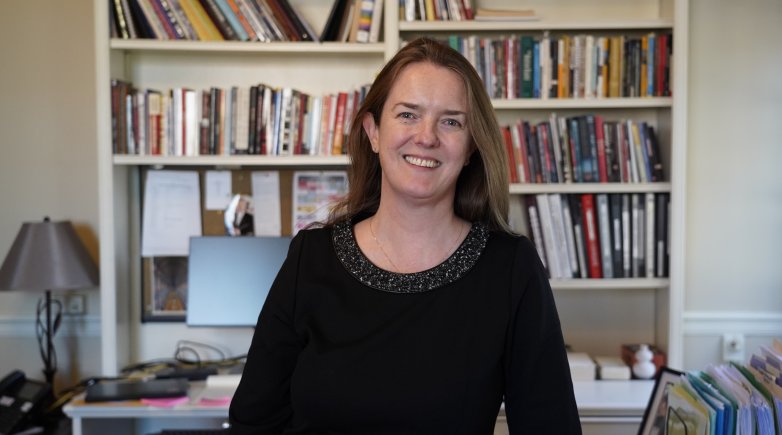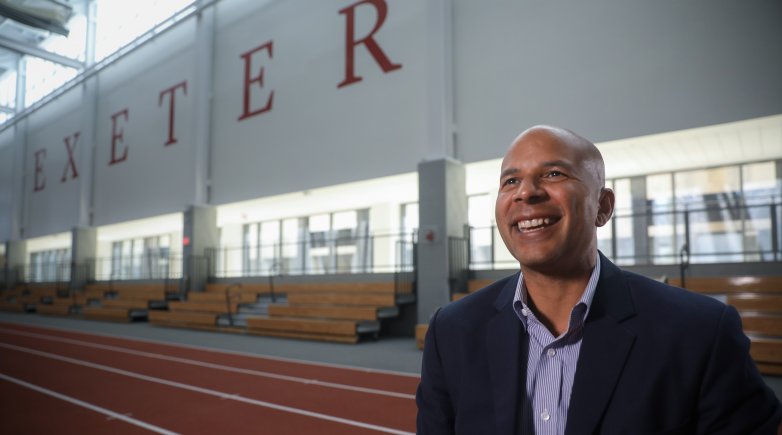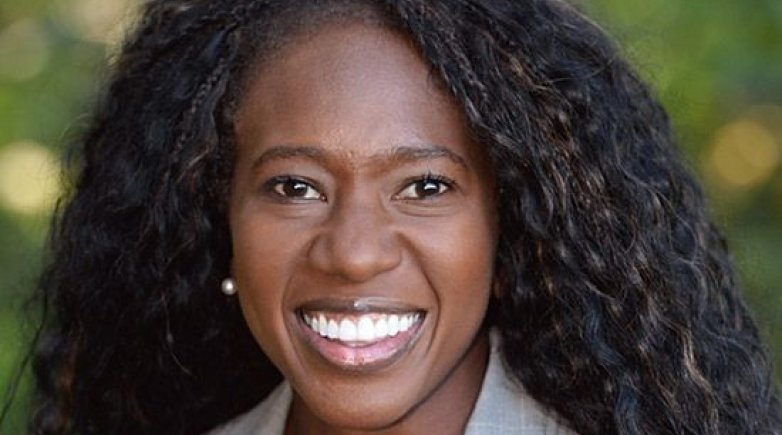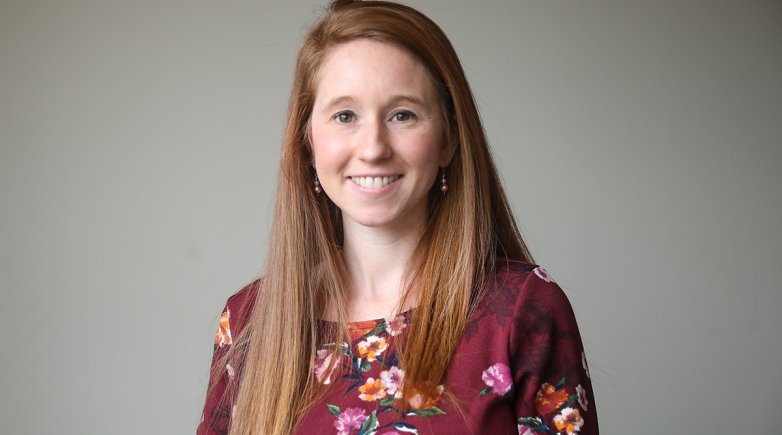A conversation with Dean of Faculty Eimer Page
Longtime English teacher and Global Initiatives founder takes on new challenge.
Music has been an integral part of Eimer Page’s life since she was a child in Northern Ireland, when she traveled the country playing the viola in youth music ensembles. At the time, the country’s vibrant social music program was the rare space where young people of different religious backgrounds were allowed to interact, and Page got to know her future husband and many of her close friends by playing together. “It absolutely changed the course of my life,” she says of the experience.
Page had another life-changing moment in 2004, when she interviewed for a job teaching English at Exeter and saw the Harkness method in action for the first time. Since earning her doctorate in post-colonial literature from Trinity College Dublin, she had been teaching for four years at a school in England, but was immediately struck by the difference.
“The freedom that both students and adults had to follow the lines of inquiry wherever they chose to take them was just shocking to me,” Page says. “It fit my style as a teacher, but it wasn't something I had ever seen elsewhere.”
Now a veteran instructor in the English Department, Page also served as Exeter’s first director of Global Initiatives, overseeing the growth of the program over the past decade to its current slate of 31 program destinations in 11 countries around the world. In 2022, Page was named dean of faculty. We caught up with her for a conversation during her first term in her new role.
What do you see as the most important parts of your role as dean of faculty?
I think the most important part of my role is just being there for the faculty. Being aware of how they are being impacted by whatever's going on, whether it's a global pandemic, changes to our policies and procedures, or the things that might happen in the life of a faculty member when they're here with us over decades. Being the person who is able to help someone…if they need a leave or FMLA, and also being there to support and champion them at times when they've done something that we should be letting the whole community know about and giving them the honors that they are due.
What are some of your goals and/or focuses, short and long term?
The thing that I'm really trying to work on this year is a sense of belonging and community, after the difficulties and challenges of separation, isolation, and the need to be distant. Figuring out how we come back to be together and trust one another and work together is really important to me this year.
How does the faculty mentorship program help cultivate that sense of belonging?
Each new teaching faculty member is assigned a mentor, and the official relationship is a two-year relationship. Having that mentor assigned as you come means you've got a point person you can go to, and they also are involved and informed in the welcome. The first year is very much a supportive relationship where the mentor is visiting the mentees classes very frequently. They’re meeting weekly, talking about the rhythms of the school year, and everything to do with the departmental work. It’s a lot about explaining what we're doing here, providing resources, and then also possibly being an advocate as needed, if a new colleague is having difficulty figuring out where to go with an issue either in or outside the classroom.
In the second year [the mentors] step back slightly. There's not quite the same level of expectation for meetings or visits, but it's still a very strong resource and there are still class visits built into the mentorship program. I think for many of us that relationship lasts long beyond the official two-year program.
Could you talk about the importance of equity and inclusion when it comes to the faculty community?
We have to figure out ways to allow people to really and truly feel that they are seen and valued here, and that we are supporting their specific needs. We also need to make sure that we are truly representing our student body and our faculty. When you have a small number of, say, faculty members of color or faculty members of a particular sexual orientation or whatever, an additional burden falls on those faculty, because students will understandably seek them out and want to talk to them. We need to make sure that the workload is evenly distributed, that it is not falling disproportionately on the shoulders of some of our colleagues and not others.
I'd say this is among the most fundamental work of the dean of faculty. It's one of the reasons why [Director of Equity and Inclusion] Stephanie Bramlett and I do our hiring interviews together, because that gives a message to our colleagues as they come into this community that this is something that we truly value. We have our school commitments to being an anti-racist institution, and we want to make sure that that's really at the heart of what we're doing when we're hiring and retaining faculty.
You were a longtime dorm head in Dunbar Hall, but you’re not living in the dorm and you’re not teaching any classes right now. How have you maintained connections with students?
I've been affiliated with Dunbar since year two here, so I have a lot of knowledge of that dorm's history. My children [Oscair ’22 and Cormac] grew up in the dorms. We moved out after year 10, so my younger son didn't live in the dorm all that long, but that's still their early childhood. That's what they remember. The thing that for me truly distinguishes working in a boarding school is the residential piece — actually living among the students.
Our interview is happening as I'm just coming off advising time, where I was with my advisees. I think both the fact that I meet them over in the English Department and the fact that they are young people with their own concerns and things going on — it really does help to ground me to still have those interactions with advisees in the dorm community. I miss and will continue to miss the teaching. I love teaching and look forward to a time when I perhaps might be able to roll that back in.



